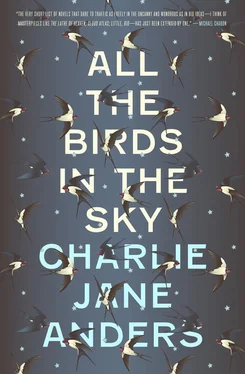Patricia followed Laurence down to Mission Street and then around a couple of side streets until they were near Shotwell, on one of those streets that goes for just a block or two. It was another itchy parched day. Patricia remembered hearing there was a creek here originally, before it was drained or paved over. Sometimes she imagined she could still feel the current of the banished ecosystem.
They reached a cement block with nothing to distinguish it from the other blocks. Laurence pulled out a key but didn’t put it in the lock on the maroon steel door. Instead, he punched a series of a dozen numbers into a keypad recessed into the wall, which Patricia hadn’t even noticed. And then he turned the key in the lock.
Two and a half flights of steps up, there was a door with a bunch of metal studs in it, and a sign that read: “PROCRASTINATION SOLUTIONS. COME BACK TOMORROW.” Laurence knocked seventeen times, in a precise sequence of long and short knocks, and the door swung open.
“Welcome to the Ten Percent Project,” Laurence said. “The local office, anyway.”
The space behind the steel door was bigger than you’d expect, and much cooler than the outdoors: a square loft, with an opaque skylight along one edge of the ceiling. Ergonomic chairs jostled against workbenches, which were stacked with equipment and soldering irons and Arduino boards and laser tools. The centerpiece of the room, though, was a massive piece of equipment, the size of a Buick, culminating in a sort of ray-gun nozzle. It was aimed at a white Plexiglas circle.
Laurence introduced Patricia, in turn, to the three people in the room:
Tanaa was an African-American woman wearing a welding mask, tank top, and shorts. Her forearms were strong, but her neck and shoulders were fluid, mercurial. Tanaa could build anything, said Laurence — in fact, she’d found Milton the same way Laurence had long ago, by figuring out some schematics on the internet. Except that these schematics were ones that nobody else had managed to make work, and they’d led to that oversized ray gun on bent legs. Tanaa waved, then went back to shooting sparks in all directions.
Anya was a freckled Midwestern girl whose nut-brown hair had blue tips, like she’d dyed it and then given up. She wore denim overalls and chunky engineer glasses, and looked like someone who never smiled. She muttered to Laurence about giving tours to outsiders.
Sougata had a thick black mustache, a Southern California surfer accent, and a Caltech sweatshirt. Laurence whispered that Sougata had wanted to work in television and had even interned at the Space: Above and Beyond reboot, but now he’d fallen back on his second-choice career of saving the world in real life.
Patricia wasn’t sure if she should ask about the big machine with the giant vacuum-tube-looking body and the pointy nozzle. But then Laurence started explaining it anyway: “We’re working on solving gravity.” He examined some readings on the machine. “We don’t have true antigrav yet, just a few isolated instances. And antigrav isn’t the point, controlling gravity is. We know that it’s a weak force in our universe, which means it’s a strong force somewhere else. And we’re trying to figure out where, or what, that is.”
“Wow.” Patricia could fly without any fancy ray, of course, but only when the situation warranted, and/or when she could trick someone into a bargain that included giving her the power of flight. (Or in dreams.) The idea of turning gravity on or off, or harnessing its power, amazed her.
She was going to be late for Kawashima’s latest assignment, an oil executive who was partway responsible for the North Sea disaster. But she wanted to admire Laurence’s machine. Laurence showed her the readouts of just how much energy throughput they had gotten into those sleek tubes without anything blowing up.
“That’s sure an impressive machine,” Patricia said. And yeah, there was something both aesthetically pleasing and satisfying about a great piece of engineering. Shiny and sturdy. She felt the same affection for this machine that she did for the old manual typewriters they sold in the hipster gallery on Valencia, or for a nice steam engine. These things were made of hubris, because they always broke down, or worse, broke everything. But maybe Laurence had been right and these devices were what made us unique, as humans. We made machines, the way spiders made silk. Staring at the red wasp-shaped chassis, she thought of how disgusted she had been with Laurence, not long ago. And maybe she shouldn’t judge him — judging was a kind of Aggrandizement — and maybe this device was the culmination of everything she’d always admired about him, from the start. And yes, a sign that they’d both won out, over the Mr. Roses of the world.
“It’s beautiful,” she said.
LAURENCE AND PATRICIA hashed out their respective relationship problems while smoking an elf-shaped bong on the couch. Laurence infodumped about Serafina, the ongoing “probation,” and then he got embarrassed about monologuing and asked Patricia about the guy she’d been drinking with. Kevin, the webcomics guy.
“Ummm.” Patricia took the bong and filled both lungs before trying to answer. “It’s confusing. I’m still not sure if Kevin and I are dating, or just booty-call friends. Whenever he sleeps over, he tries to steal away in the middle of the night. But nobody can sneak out on me, after all the training I’ve had. So he winds up either having to say goodbye properly or staying until morning. He’s tried both, and neither way quite seems to work for him.”
“Ah.”
“I keep almost having a conversation with Kevin about what it is we’re doing, and then it doesn’t materialize.”
Somehow seeing the wooden Mr. Rose had been a turning point in Laurence and Patricia’s relationship, not just as a bonding thing but also as a reminder that they had known each other as total losers in eighth grade. Patricia might be the hardest person for Laurence to disappoint, because she’d already seen him at his worst. In fact, this was the most at ease Laurence had felt in months, and not just because of the elf bong.
Nobody talked for a while, until Patricia changed the subject: “So how are your parents? Still wanting you to be outdoorsy?”
“I think they are actually pretty happy,” said Laurence. “They got divorced about seven years ago, and my mom found a guy who likes to go bird-watching. My dad quit his awful job and went back to college to become a high-school teacher. I always kind of thought they’d be happier if they split up, even though you never want to root for your parents to do that. How are yours?”
“They’re, uh … okay,” said Patricia. “They actually disowned me for a few years, but this past year they’ve made this big effort to reconnect.” She sighed and sucked in more smoke from the elf’s head, even though her throat was getting scratchy. “It’s all thanks to my sister, sort of. Roberta keeps getting arrested, or winding up in the ER. She was always the one who had it together, of the two of us. Now, all of a sudden, my parents have noticed that I’m holding down a job and don’t have a criminal record, and they’ve decided that I can be the good daughter now. Like Roberta and I could just trade places. I have no idea how to deal.”
Laurence was going to say something else, but Isobel came home. She was soaked, because it was raining and the experimental self-configuring umbrella had gotten stuck in a nonoptimal shape, judging from the complainy servo noises it was making and the fact that the left side of Isobel’s cardigan was drenched while the right side was totally dry. She no longer had the long brown braids she’d sported when he’d first met her as a child and instead wore her graying hair in a bob.
Читать дальше












